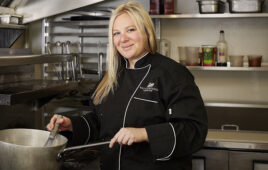For Amarillo CC’s Executive Chef Colby Newman, cultivating a strong team is more important than keeping unmotivated employees.
It takes a lot of people to make a country club kitchen run successfully, but as I’ve learned over the years as the Executive Chef of Amarillo (Texas) Country Club, working hands doesn’t necessarily make for a more productive kitchen.
Between a la carte and banquets, I have around twenty employees in my kitchen with up to a dozen working during a single shift. But with one of the lowest unemployment rates in Texas, and no culinary schools nearby, it’s a challenge to even find qualified people who want to work here in Amarillo. So, when an application does come in for someone with even a little kitchen experience, it’s important for me to schedule an interview to see if there’s potential and if they have the willingness to learn.
To help keep a low turnover rate, and because all new employees come in with a range of abilities, we need to provide everyone with the tools and training they need to help them succeed in their position. Unfortunately, whether it’s their attitude or skills, not everyone turns out to be a good fit for the team or cut out to work in a kitchen, and the dreaded “I have to let you go” conversation has to take place.
A lot of responsibilities come with being an Executive Club Chef, but one of the hardest things for me is having to fire people. No matter how often it happens, it’s something that never gets easier. But I have to remember that the club is a business and it has to be run a certain way, and no matter how much I care about the person, things can’t get personal. My job is to provide our members with the highest quality food. Being a good person is irrelevant if you don’t have the desire to help me meet the needs of our members.
What a lot of my employees don’t realize is that even though they report directly to me, I have people I report to as well. I have the Board, General Manager, and all our members who hold me to certain expectations. And if my team isn’t helping me meet those expectations, I’m the one who is responsible. I have to be tough on my team to help us keep the highest standards, but I don’t want to be someone who my employees constantly fear or are uncomfortable around. I have to find that balance of getting along with my staff, while still being respected and listened to—especially during difficult and stressful situations.
I care about the people who work for me, but there are always those employees who eventually take advantage of my kindness. They start to call in, show up late, give excuse after excuse, become complacent, and ask for second and third chances. So during busy times, and with only so few applications on your desk, it can be easy and tempting to keep an employee around just because you need the extra set of hands, hoping that maybe they’ll improve after their second strike.
But is having an unreliable worker just to help get you through really going to make it any easier for the other hard working members of your team? From what I’ve learned, not everyone you lose is a loss.
If there’s anything I’ve learned about working as part of a team in a kitchen it’s that we rally together when times are stressful, and we work well, if not better, under pressure. We help each other out and pick up the slack of other employees who just aren’t cutting it. We stay late, come in early, or skip breaks to help the team, and we have an easier time completing tasks once the weak links are gone and not holding us back with poor attitudes or work ethic.
Not everyone is the right fit. But it’s important to take care of the employees who are there for the right reasons, the dedicated employees who are helping you achieve your goals of satisfying your members and elevating your operation.



